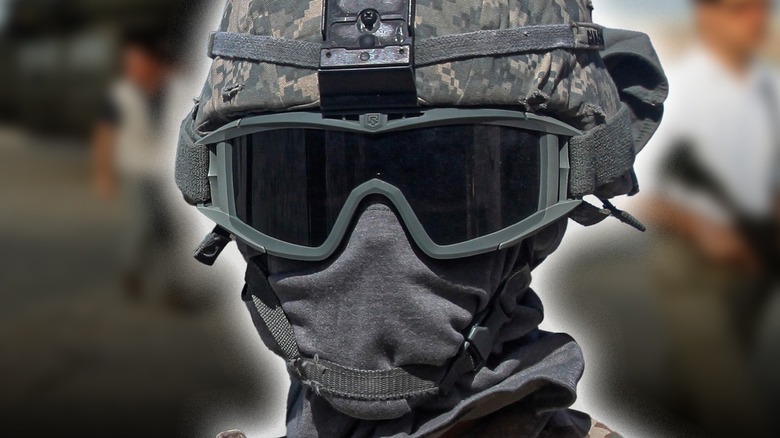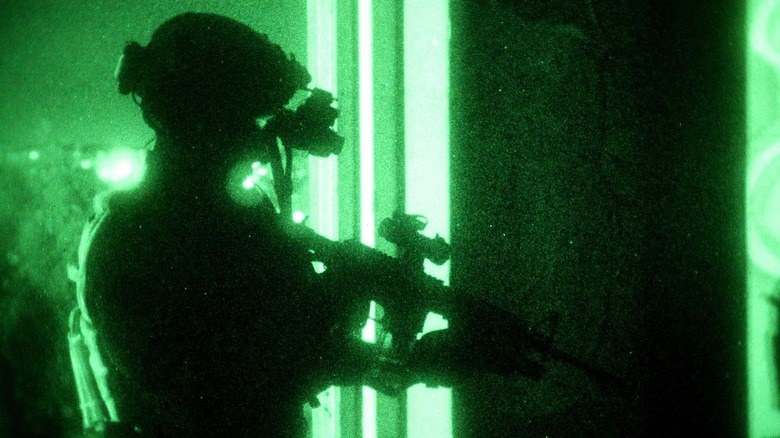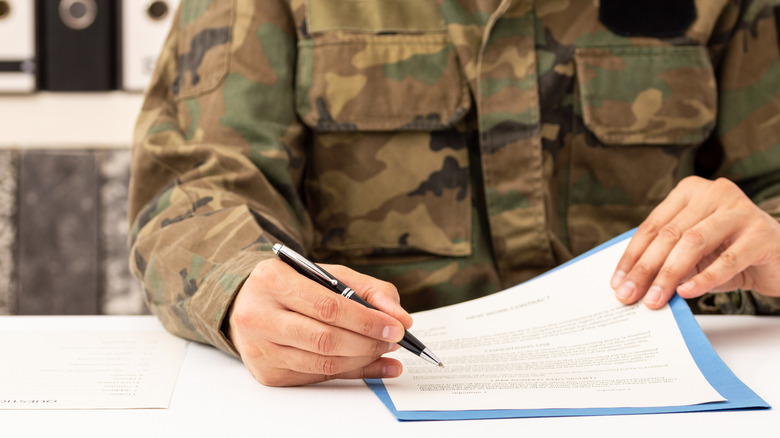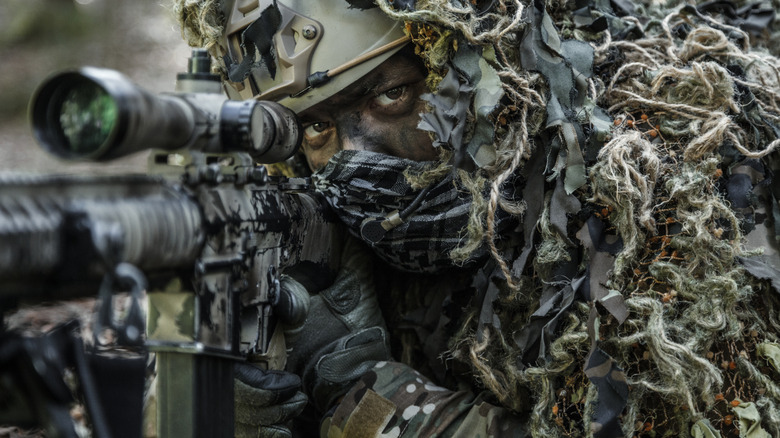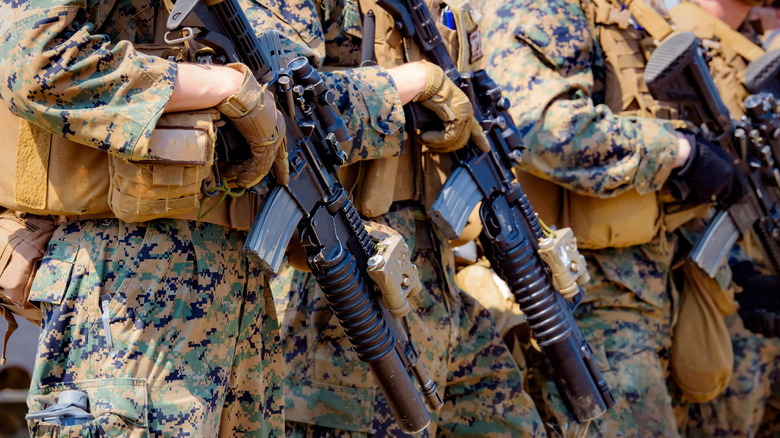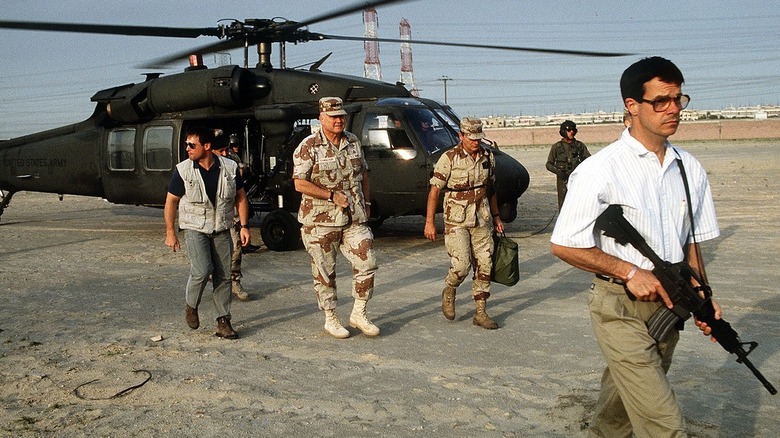Strange Details Everyone Ignores About Delta Force
So we've heard of Delta Force, right? It's that 1986 movie featuring Chuck Norris Chuck-Norrising his way through a typical milieu of chase scenes, shooting scenes, hand-to-hand combat scenes, and maybe there was a plot — who knows? But the real Delta Force? As in, the U.S. Army's elite special forces unit founded in 1977 as a counterterrorism unit but which has since come to be known as cultivating the badassest of the badasses? Sorry, Chuck, you're great and all, but let's all step aside for the professionals.
It's actually a tricky thing talking about Delta Force because, by its nature, it's a highly secretive outfit. We've got some inside info from former Delta Force members, usually in the form of stories about physical training regimens and interpersonal vignettes, but no nitty-gritty operational information. We do know what military operations they took part in, like Operation Kayla Mueller which killed Islamic State terrorist Abu Bakr al-Baghdadi.
We also know the general structure of Delta Force, per My Base Guide, because it was modeled on Britain's legendary Special Air Service (SAS): Squadrons A, B, C, and D focus on assault, E Squadron covers aviation, G Squadron does clandestine work, and the Combat Support Squadron support units with things like intelligence and medical needs. Per SOFREP, we also know the career requirements necessary to apply, like having no military disciplinary record.
All those broad strokes make complete sense. Other facets of Delta Force are surprising, like its lack of recruitment measures, its acceptance of soldiers from any branch of the military, and even lax grooming standards.
Delta Force has never publicly admitted that it exists
So do we all remember when Space Force became a thing in 2019? Congress passed the National Defense Authorization Act, "to provide for freedom of operations in, from, and to the space domain for the United States," per Congress.gov. There were official documents with tables and headers, a big announcement to the press, lots of openness about Space Force's logo and general goings-on, a dedicated governmental website talking up Space Force and serving both as advertisement and justification for its existence, etc. But Delta Force? That never happened and still hasn't. In fact, the U.S. government has never once said that Delta Force even exists.
Delta Force amounts to something like an "open secret" that everyone knows but those in authority never say is true. If you spot any information online about Delta Force, it's because that information has come directly from the horse's mouth, as in: former Delta Force members. That includes all the pseudonyms used to cover up Delta Force's real name, like "the Unit," the Combat Applications Group (CAG), Army Compartmented Elements (ACE), and Task Force Green.
Even though the U.S. government has never admitted that Delta Force exists, Delta Force operatives have given us plenty of testimonials. This includes info about camaraderie and rivalry between Delta Force and Navy SEALs, non-stop physical and tactical training, personal call signs like "ninja," combat stories, and even inside info on what happened during operations like the hunt for Osama bin Laden.
[Featured image by Allied Joint Force Command Brunssum via Wikimedia Commons | Cropped and scaled | CC BY-SA 2.0]
Delta Force has no direct recruitment procedure
So if some dude is sitting at home fantasizing about elite Call of Duty PvP kills, can such a person sign up to join Delta Force? Sure, if that person joins another branch of the military and works his way from there. Reason being: Delta Force only accepts candidates from within the military. There's no recruitment center, no sign-up station, and no way in from the outside.
As American Special Ops outlines, to try out for Delta Force you've got to be 21 years old, a U.S. Citizen, and an active military member. Officers have requirements like they should be a captain or major and have a bachelor's degree, and noncommissioned officers (NCOs) need to have a rank of sergeant, four years of service, and a passing MOS (Military Specialty) score, which demonstrates competence in some certain military role like infantryman or combat engineer.
It's believed the Delta Force application process starts on-site in spring or fall at Fort Liberty, North Carolina. It involves a three-to-four-week initial Assessment and Selection (A&S), including fitness basics like sit-ups and push-ups and advanced things like an 18-mile nighttime "ruck march" carrying a 35-pound sack. Candidates who pass move on to the Operator Training Course (OTC), which lasts six months and involves learning actual, operational Delta Force duties like hostage rescue. And then once you're in, you're on probation and your every move is tracked to determine if you can hack it. It bears mentioning that Delta Force has a 90% attrition rate.
Delta Force pulls from numerous military branches
If Delta Force only accepts candidates from within the military, which military divisions does this include? Looking at Navy SEALs, it's right there in the title: SEALs come from the Navy and need special training related to being sailors because they engage in water-to-land and land-to-water operations. But Delta Force? They're associated with the U.S. Army, but they accept candidates from any branch of the military, including SEALs. Yes, Delta Force really is the elite of the elite.
Former Delta Force member George Hand IV broke down recruitment to Insider. "In my time," he said, Delta Force was, "60% Green Berets, 39% Rangers, and 1% random guys, such as cooks, chaplain assistants, and mechanics." Over time, fewer Green Berets and more Rangers have been trying out, as well as special forces like Air Force Pararescuemen and Marines Recon and Raiders. With pride, Hand said that an outfit like the SEALs doesn't get special ops guys wanting to join, only regular Joe Shmoe sailors. This means that Delta Force gathers a wide variety of veteran military experiences and skills under its umbrella.
Keep in mind that any of the above-mentioned special forces outfits like Army Rangers aren't exactly a cinch to get into, either. The official Army Rangers recruitment site (the kind that Delta Force doesn't have) mentions three training phases, including 20 days of "preparing your mind and body," 21 days "in the mountains learning combat patrol missions," and a final phase conducting missions in swamps.
Delta Force has lots of smallish guys
With all this talk of nigh-impossible physical challenges and insanely high benchmarks for performance, folks might be inclined to imagine all Delta Force dudes looking like beefy gym bros or something. On the contrary, one former Delta Force member described himself in an interview with David Hookstead on YouTube as "just a 5'7 dude" who doesn't come across as particularly physically imposing. In comparison to Navy SEALs, who are "bigger and studlier," he said that Delta Force has "a lot of skinny, scrawny guys." He admitted that Delta Force would probably lose in a fight "if it's going to be UFC," but Delta Force gains the upper hand in certain skill domains like hostage rescue.
Going back to Delta Force's minimum requirements for application, American Special Ops says that potential applicants must have "no limiting physical profile." This means that someone can't be considered for Delta Force if unable to do all the physical things required of a Delta Force member. But beyond this bare-bones minimum threshold, it actually makes sense that Delta Force members needn't be big and burly, because its Assessment and Selection (A&S) and Operator Training Course (OTC) assumedly tests for what's required of a Delta Force member, and only that. Whatever gets tested ought to reflect the skills needed during operations, which don't necessarily mean being monstrously jacked. As we mentioned, Delta Force is a team composed of people exhibiting highly refined skill sets, not a brute goon squad.
Delta force members have 'relaxed grooming standards'
Just to drive home the point about Delta Force being a surgical, finesse, versatile unit, we've got our final surprising Delta Force detail: "relaxed grooming standards," per The National Interest. If any place is going to have strict regulations regarding hair and facial hair, it's the military. Everyone knows this. And even though the U.S. Army website has "expanded our appearance policies to be current and more inclusive," some things are 100% a no-no. This includes dyed hair that looks unnatural, garishly styled hair, hair that interferes with someone doing their job (like wearing a helmet), and so forth.
So why would Delta Force allow its members more latitude when it comes to appearance? Like we said before, it all depends on the task at hand. Reaperfeed, for instance, has multiple pictures of Delta Force dudes undercover in Afghanistan with full beards, shaggy appearances, local dress, and so forth. The safety and duties of the men in these photos would be instantly compromised if they walked into a volatile, undercover situation in a foreign country looking like they left an office building in Manhattan or something. Contrarily, another job might require Delta Force members to look clean-cut, even pedestrian, like when they escorted General Norman Schwarzkopf to safety during the Gulf War (pictured above). "Relaxed grooming standards" doesn't mean a free-for-all, it just means that not everyone is held to the same expectation because everyone has a different job to do.
[Featured image by Staff Sergeant Dean W. Wagner via Wikimedia Commons | Cropped and scaled]
